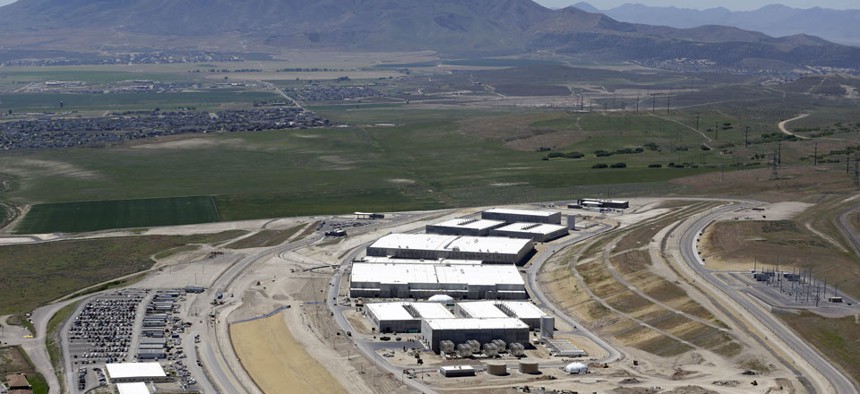Obama Administration to Disclose New Changes to NSA Spying

The National Security Agency's Utah Data Center in Bluffdale, Utah. Rick Bowmer/AP
The intelligence community will release more information about post-Snowden changes to its surveillance programs by the end of the month.
The Obama administration is planning to issue a series of progress updates about its efforts over the past year to reform the National Security Agency's mass-surveillance authority, National Journal has learned.
An announcement is expected to come by the end of the month, a White House spokesman said, and will include details about changes to the NSA's bulk collection of domestic phone records, one of the most controversial programs revealed by Edward Snowden 18 months ago. Some of that information was released Thursday in a report by the National Research Council, which concluded the use of software alone cannot entirely replace bulk surveillance.
Deputy press secretary Shawn Turner described the information as a report that will explain progress made on intelligence reforms called for by President Obama almost exactly a year ago when his administration was besieged by a seemingly endless torrent of Snowden-fueled revelations.
The White House would not comment more specifically on what updates would be included in the report, which it said is not likely to be mentioned in Obama's State of the Union address next week.
"I guarantee you that there will be some things here that are not already out in the public," Turner said. "What you'll see is that the intelligence community has made significant progress toward our goal, toward the administration's goal, of protecting civil liberties and privacy while making sure that the intelligence community has the tools it needs to safeguard our national security."
A former White House official said the administration had originally intended to provide an NSA update to coincide with the anniversary of Obama's Jan. 17 speech last year, in which he outlined a series of immediate administrative reforms and also called on Congress to send him a bill with more substantial changes to surveillance protocol.
But the process appears to have been delayed and the report will now come out at the end of January. Multiple privacy groups said they were contacted by the White House this week to review the updates but the meeting was cancelled.
Turner said the report will provide readers with enough information to make side-by-side comparisons of progress made under a presidential policy directive next to recommendations made by the Privacy Civil Liberties Oversight Board and a separate presidential review group. Both entities spent months reviewing the NSA's bulk collection of U.S. call data and separately issued reports deeming the program largely ineffective.
Still, the updates will likely do little to satisfy privacy advocates, who continue to push for comprehensive surveillance reform in Congress. Those groups have criticized the Obama administration in recent months for not being more vocal on pressuring lawmakers to pass such legislation, a complaint that grew louder this week as the administration launched an aggressive campaign to pass new cybersecurity legislation.
During his speech a year ago, Obama outlined what he called "concrete and substantial reforms" intended to rein in the NSA's sweeping surveillance powers—and restore the public's faith in the government's intelligence community.
"The reforms I'm proposing today," Obama said at the time, "should give the American people greater confidence that their rights are being protected, even as our intelligence and law-enforcement agencies maintain the tools they need to keep us safe."
Obama's proposed reforms, however, came with one huge caveat: Congress needed to get on board. While the president announced a series of immediate steps to be taken administratively—such as reducing the number of "hops" away from a
Among those changes, Obama pledged to end the bulk collection of telephone metadata "as it currently exists."
In November the Senate came within two votes of advancing legislation that would have pared back the NSA's domestic spying powers, but the measure was unable to overcome a filibuster by Republicans who warned that scaling by any intelligence capabilities could help the Islamic State and other terrorists kill Americans.
The USA Freedom Act, which first emerged in the months following Snowden's initial wave of revelations, would have effectively ended the government's mass collection of phone metadata—the numbers and time stamps of phone calls but not their actual content. It was widely supported by the tech industry, privacy and civil-liberties advocates, the Obama administration, and even senior intelligence officials, including Director of National Intelligence James Clapper.
Under the bill, phone companies such as Verizon would retain metadata records, which intelligence agencies could obtain only after being granted approval through the Foreign Intelligence Surveillance Court. Obama, in his speech last year, called for such a transition.
This story has been updated with further information from the White House.
NEXT STORY: Why Republicans Suddenly Love Net Neutrality



